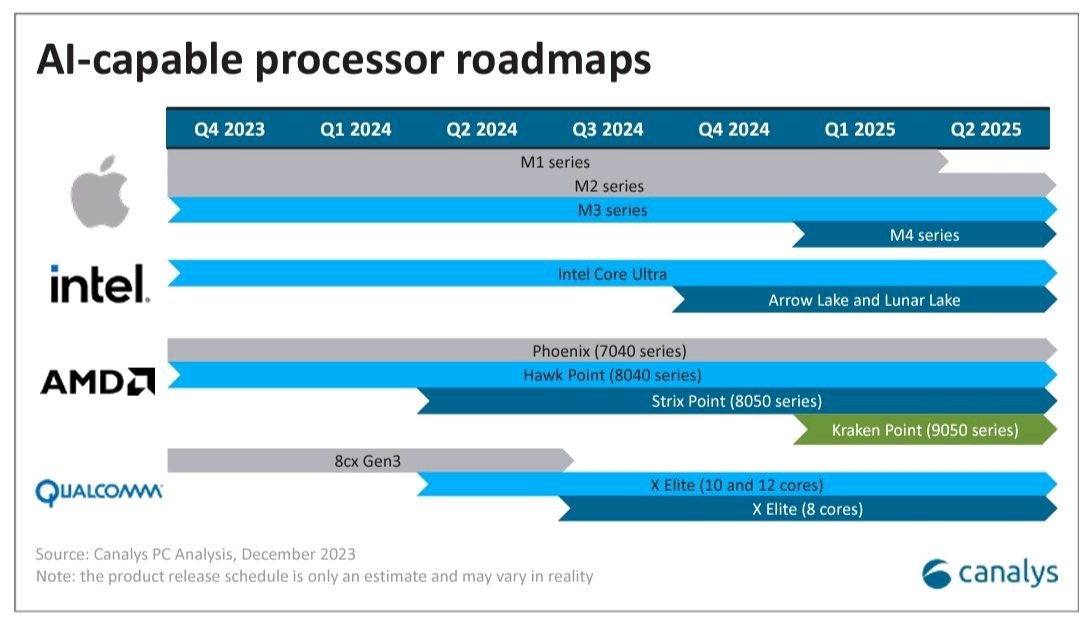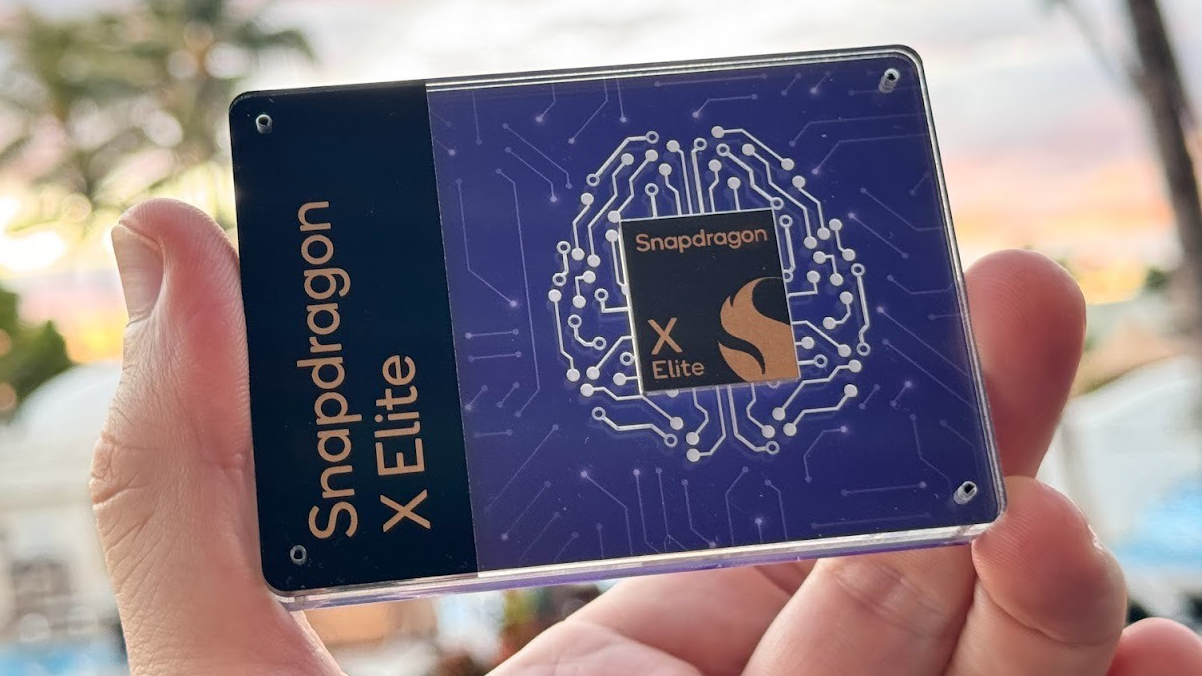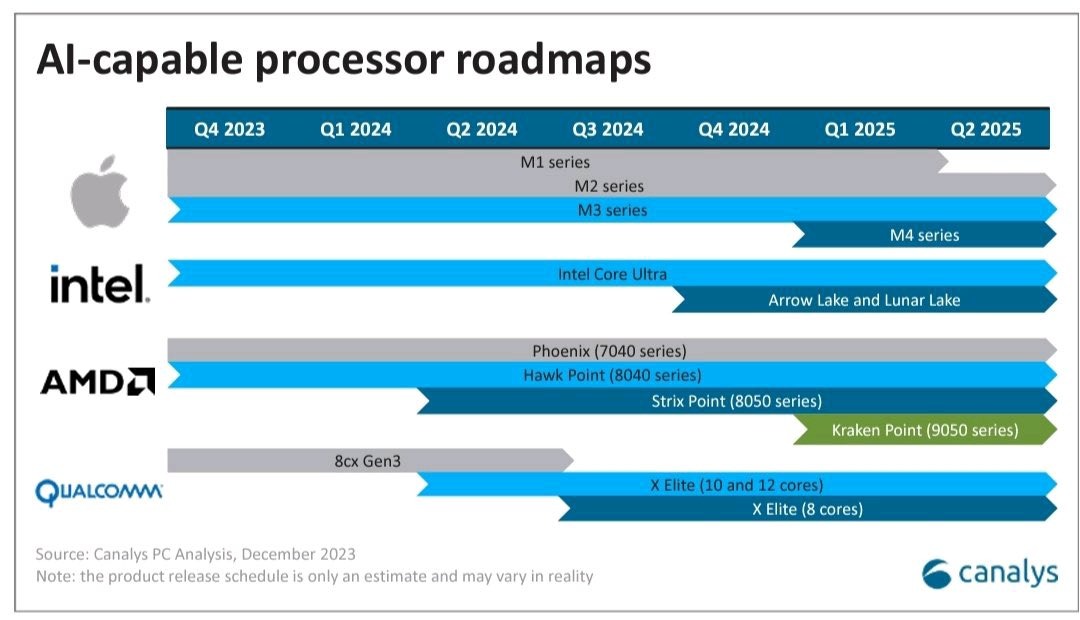We recently got a look at Apple’s alleged product roadmap through 2027, once again teasing us with OLED MacBooks, but for those who care more about what’s on the inside, a recent Canalys report may be even more intriguing.
The “AI-capable processor roadmaps” from the research firm offer projections for the release schedule of the four major players in the laptop market (via Wccftech).
Apple M4 vs. Qualcomm Snapdragon X Elite: Expected release date
Qualcomm will be the first out of the gate in this race with the initial Snapdragon X Elite chips likely arriving this summer. As the Canalys roadmap shows, these should be 10- and 12-core variants, the more powerful from Qualcomm that we have occasionally seen beating Apple’s M3 in benchmarks. The more modest 8-core chips, think MacBook Air competitor rather than MacBook Pro, aren’t expected until the second half of 2024.
While Apple first released the M3 chips in October 2023, according to the roadmap from Canalys, we’ll be waiting a little longer than expected for the M4 chips. This fits an early March report from Mark Gurman of Bloomberg suggesting that “formal development” had just begun on the M4, which would seem like a tight turnaround for an October event. Pencil in an early 2025 arrival for the M4, Wccftech even speculates it could push into Q2 of 2025.

Apple M4 vs. Qualcomm Snapdragon X Elite: Performance
The million (billion?) dollar question is what the performance of these chips will look like. While I attended Qualcomm’s Snapdragon Summit last October and got a chance to watch benchmarks run on prototype hardware, there are still no shipping laptops with any of the Snapdragon X Elite chipsets in them. I’m not dismissing the X Elite Geekbench 6.2 results beating out the MacBook Pro 14 M3, but until I can point to a product that someone can buy pulling off that feat, I’m not willing to crown Qualcomm the victor.
It’s also important to note that these early chips are all the 12-core variant of the Snapdragon X Elite and likely the 80W TDP, rather than the more ultraportable friendly 23W. Given that these Geekbench 6.2 results are narrowly edging out the M3 with the higher X Elite configs, it’s a safe bet that the 8-core won’t meet the M3, let alone the M4.
Apple’s M4 is far more of a mystery at this point. Leaks have pointed to Apple working on a 2nm chipset, but that may be the M5. If we are to assume then that the M4 will follow a similar trajectory to the upgrade we saw from M2 to M3, it should deliver a Geekbench score of a little over 15,000. That would be enough to beat even the highest results we’ve seen from a Snapdragon X Elite prototype by about 23%.

Outlook
The inevitable question is, “Which chip will win?” but we’re not close to having a complete answer to that question yet. Based on what we are seeing so far this year the answer may be that whichever chip comes out on top, consumers are the ones that are winning.
I’ve been thrilled to see Intel Core Ultra laptops deliver dramatically improved battery life this year, the Asus Zenbook 14 OLED 2024 just outlasted both MacBook Air M3 models! What seemed like a massive lead for Apple, has been whittled down quickly by the competition.
Qualcomm certainly thinks it will be the next to challenge Apple. We just need the Snapdragon X Elite to get off the practice court and into the game so we can see whether it can pull off this upset in real conditions. (Sorry, the March Madness is seeping in.)
The next year should be a wild ride in the laptop chip market and that’s before we even factor in the impact of AI. Every one of these new chips features a powerful NPU that can unlock new AI experiences, but it still feels like most companies are just paying lip service to AI without actually showing it in action.
Even if Apple’s M4 isn’t ready until 2025, maybe AI is where Apple makes its impact felt in 2024. Keeping with the March Madness metaphor, Apple isn’t about to let this Cinderella story come in and knock them out of contention. Safe to say we’ll be following along with intrigue and keeping you up-to-date as Apple, Qualcomm, Intel, and AMD all look to claim the AI PC trophy.
Back to Laptops







